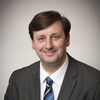
Professor Ian Robertson
- Position: Professor
- Areas of expertise: microwaves; millimetre-waves; robotics; antennas; system-in-package technology
- Email: I.D.Robertson@leeds.ac.uk
- Phone: +44(0)113 343 7076
- Location: 2nd floor EEE School of Electronic and Electrical Engineering
- Website: Googlescholar | Researchgate
Profile
Ian Robertson received his BSc (Eng.) and PhD degrees from King’s College London in 1984 and 1990, respectively. From 1984 to 1986 he worked in the GaAs MMIC Research Group at Plessey Research, Caswell. After that he returned to King's College, initially as a Research Assistant working on the T-SAT project and then as a Lecturer, leading the MMIC Research Team and becoming Reader in 1994. In 1998 he was appointed Professor of Microwave Subsystems Engineering at the University of Surrey, where he established the Microwave Systems Research Group and was a founder member of the Advanced Technology Institute. In June 2004 he was appointed to the Centenary Chair in Microwave and Millimetre-Wave Circuits at the University of Leeds. He was Director of Learning and Teaching from 2006 to 2011 and Head of School from 2011 to 2016. He has 30 years of teaching experience in RF and microwave engineering and has published over 400 peer reviewed research papers. He edited the book "MMIC Design" published by the IEE in 1995 and co-edited the book "RFIC & MMIC Design and Technology", published in English 2001 and in Chinese in 2007. In 2016 he co-authored the book "Microwave and Millimetre-Wave Design for Wireless Communications", published by Wiley.He was elected Fellow of the IEEE in 2012 in recognition of his contributions to MMIC design techniques and millimetre-wave system-in-package technology. He was General Technical Programme Committee Chair for the European Microwave Week in 2011 and 2016.
Responsibilities
- Programme Manager, MSc Engineering Management (Online)
Research interests
Field Robotics (with Prof Richardson in Mechanical Engineering)
This activity focuses on communications and sensing in civil engineering applications. The major current funded projects that we contribute to include:
- Balancing the Impact of City Infrastructure Engineering on Natural systems using Robots, EPSRC Grand Challenge http://selfrepairingcities.com/
- Pervasive Sensing for Buried Pipes, EPSRC Programme Grant. This project, led by the University of Sheffield, is researching into advanced robotic swarms that can inspect and repair the underground pipe network (http://pipebots.ac.uk/).
Wireless Communications (with Drs McLernon, Z. Zhang and A. Zaidi)
This area focuses on microwave and millimetre-wave hardware for a wide range of applications including Internet of Things (IoT), robotics, wearable electronics, wireless power transfer and "5G+" communications systems. A wide range of exciting project areas is being developed across all industry sectors, such as Smart Cities, Healthcare, Industry 4.0 and Digital Media.
Millimetre-Wave System-in-Package Technology for Integrated Transceivers (with Dr Somjit)
This area includes modelling and design of multilayer circuit techniques, such as reconfigurable couplers, baluns, filters, antennas and substrate integrated waveguides in multilayer PCB and low-temperature co-fired ceramic (LTCC) technology. LTCC systems integration and micromachined components are studied at Leeds using laser-based prototyping. The fabrication of hollow waveguide and microfluidic structures in LTCC has attracted widespread interest. With this technology in hand, a wide range of millimetre-wave communications and sensing applications are being developed, including sensors for healthcare applications and exploration robotics.
High-Frequency MEMS (with Dr. Steenson, Dr Somjit)
High-Frequency MEMS devices offer superior figure-of-merit compared to semiconductor circuits in terms of very low losses, high signal isolation, excellent linearity, virtually zero-power consumption, and extremely large bandwidth. Therefore, MEMS are near-ideal devices for high-performance, high-frequency systems and offer a broad-spectrum of applications. Research activities in high-frequency MEMS at Leeds ranges from radio frequency (RF) to millimetre waves, and THz for various applications in e.g. high-performance wireless communication and, medical and biomedical systems. The research also includes novel material characterisation for millimetre and submillimetre-wave applications, as well as development of novel planar and 3D micro/nano-fabrication techniques facilitated by state-of-the-art cleanroom and modern high-frequency measurement laboratory at Leeds.
3D Printed Components (with Dr Somjit, Prof Cunningham)
The work on THz fibres, supported by Agilent Technologies, is comparing different microstructured fibres and has led to renewed interest in Bragg fibres as a means of realising a THz waveguide with exceptionally low loss for a wide range of applications. Experimental work is underway to characterise suitable low loss polymers and fabricate fibres with the optimum design, making use of Leeds' 1.1 THz PNA-X.
Medical Applications
This emerging area of research focuses on the use of microwaves and millimetre-waves in medical applications such as biosensors, wireless power transfer for medical robotics, wearables and surgical tools.
<h4>Research projects</h4> <p>Any research projects I'm currently working on will be listed below. Our list of all <a href="https://eps.leeds.ac.uk/dir/research-projects">research projects</a> allows you to view and search the full list of projects in the faculty.</p>Qualifications
- BSc (Eng)
- PhD
Professional memberships
- Fellow IEEE
Student education
My primary teaching activities are in the areas of high frequency electronics, the electronics industry and engineering management. I have taught a wide range of subjects over the years, on degree programmes from Product Design through to Sustainable Energy Systems and Mechatronics and Robotics, as well as on our core EEE programmes. From 2017 to 2022, I was Programme Manager for the online MSc in Engineering Management.
Research groups and institutes
- Institute of Robotics, Autonomous Systems and Sensing
- Microwave and millimetre-wave engineering

